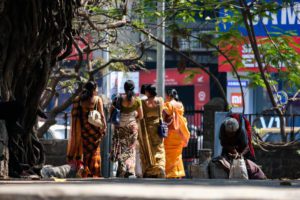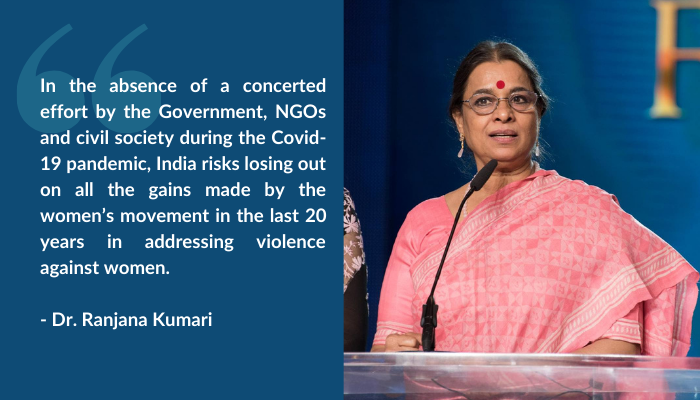Written by: Dr Ranjana Kumari
Women’s participation rate in the formal sector in India was low prior to the onset of the pandemic. As per Census 2011, the workforce participation rate for women was 25.51 percent, which is less than other countries in South Asia, such as Nepal and Bangladesh. More women are present in low paying jobs and in the service sector. Multiple explanations, including shrinking spaces in the formal sector, unequal pay, termination of employment upon pregnancy and sexual harassment at the workplace has led to women in India dropping out of the formal workforce.
Impact During Covid-19 On Women At Work
With the onset of the Covid-19 pandemic, as jobs in the formal sector shrink even further, women are likely to face even more gender-based discrimination and harassment at the workplace. Women are usually the first to be fired, and it is estimated by the Centre for Monitoring Indian Economy that 4 out of 10 women have lost their jobs as a result of the Covid-19 pandemic.
With the lockdown and work-from-home, it was expected that cases of VAW (violence against violence) and sexual harassment would decrease. Instead, reported cases of domestic violence and digital harassment have increased. Women (who are overburdened with housework), are expected to be available at all times professionally as the distinction between home and office gets blurred. Increasing domestic violence and digital bullying have made work from home difficult for women workers.
Reported incidents of domestic violence under the ‘right to live with dignity’ increased almost by twofold according to the National Commission for Women (NCW) during the lockdown. The NCW received 2043 complaints of crimes against women in June 2020, the highest in the past eight months.

Child Marriages On The Rise
As the Indian economy contracted by a historic 23.9% following the unplanned lockdown in March 2020, loss of jobs and livelihood translated into children being pulled out of schools, early marriages and increase in child labour. When the lockdown eased in June and July, child marriages spiked, marking a 17% increase over the previous year.
According to a report by Thomson Reuters Foundation, as Covid-19 brought industries to a halt and schools were shut, activists and officials in different parts of India, more specifically, from the southern state of Tamil Nadu to western Maharashtra observed an unexpected trend: child marriages were on the rise.
Weddings of girls are taking place discreetly and quietly as schools remain closed. According to the same report, childline officials have reportedly stopped 5,200 child marriages between March 2020 and May 2020.
Increase In Trafficking
Increase in human trafficking is a real threat posed by joblessness and growing economic frustration. According to ‘State of India’s Environment in Figures 2020’, published by the Centre for Science and Environment (CSE), India is expected to add 12 million more poor to its population.
Trafficking in women and children is also bound to increase with growing economic desperation. For example, in Chitrakoot district of Uttar Pradesh, minor girls have been reported as being sold for sex for as little as Rs. 150 to Rs. 200 per day. A 30-year-old man from Rajasthan purchased a 13-year-old child bride from Sonbadhra, Uttar Pradesh, and sexually abused her before she called Childline. The Ministry of Home Affairs issued an advisory in July 2020 asking all States to set up more Anti Human Trafficking Units in the wake of Covid-19.
The above data demonstrates the growth of the ‘shadow pandemic’ – that is, growing crimes and violence against women, is as rampant in India as the health pandemic posed by Covid-19. In the absence of a concerted effort by Government, NGOs and civil society, India risks losing out on all the gains made by the women’s movement over the past twenty years in terms of addressing VAW and economic rights of women.
About the author: Dr Ranjana Kumari is the Director of Centre for Social Research. She has been a vocal advocate for gender justice in South Asia for several decades. In 2019, Dr Kumari was named as one of the 100 Most Influential People in Gender Policy globally.
Ungender Insights is the product of our learning from advisory work at Ungender. Our team specializes in advising workplaces on workplace diversity and inclusion. Write to us at contact@ungender.in to understand how we can partner with your organization to build a more inclusive workplace.










